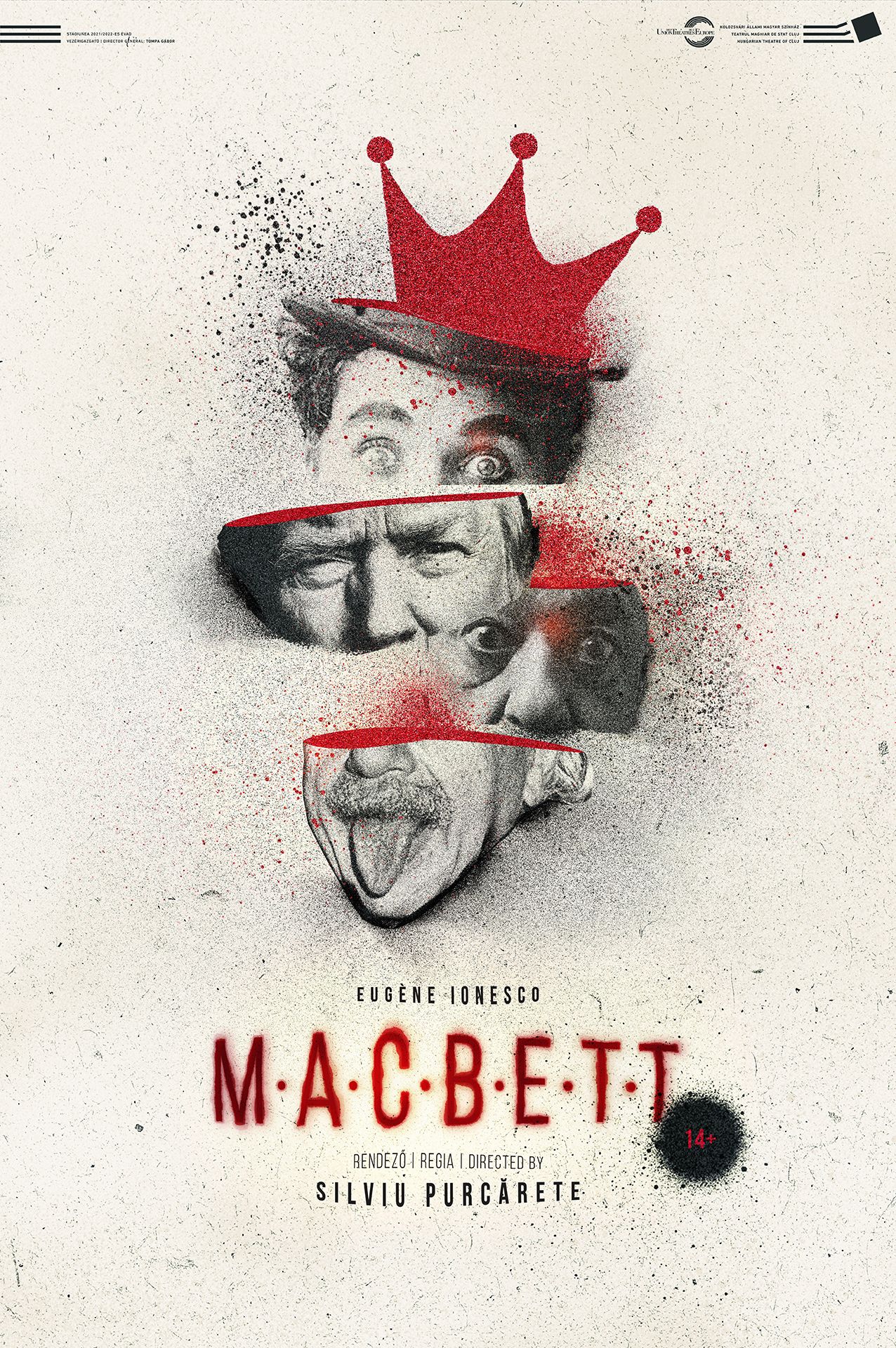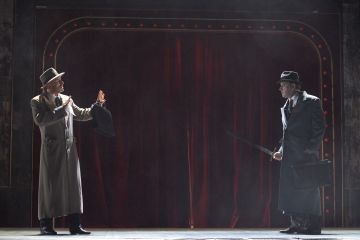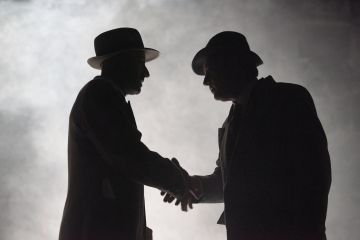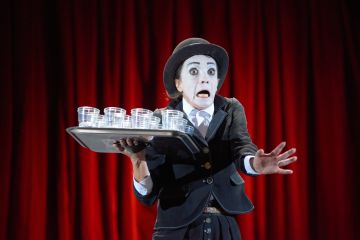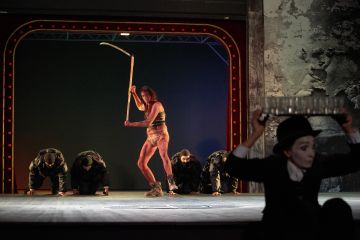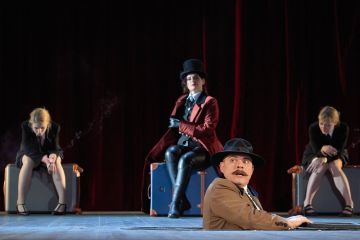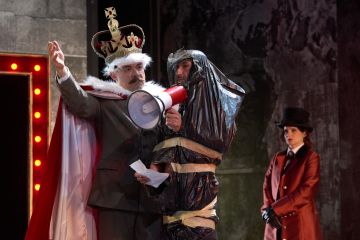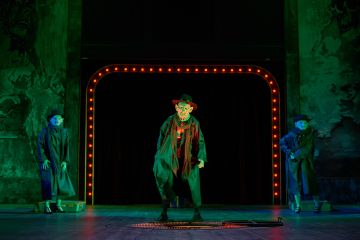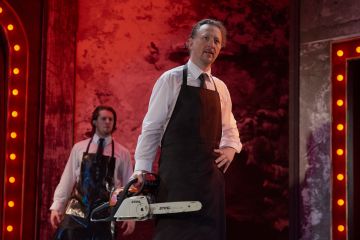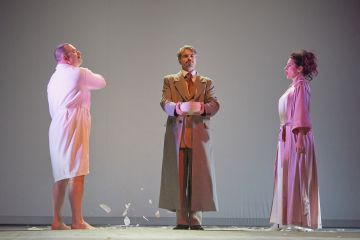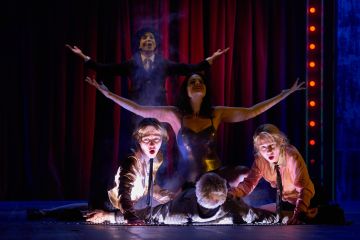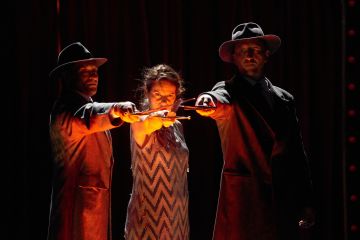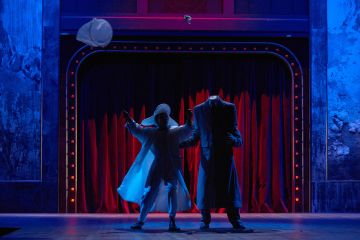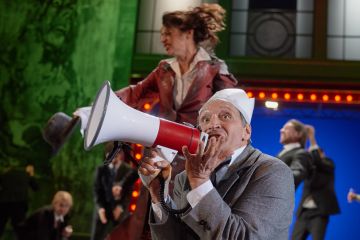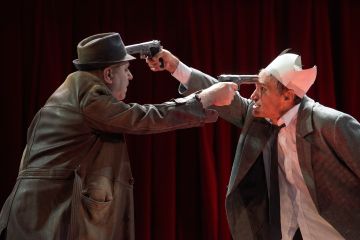The visual and poetic universe is made up of the light which becomes a character, projecting states and emotions – white-cold, neutral, blue, green –, the subconscious, dream-like plane, of the collective monochrome and synchronous characters such as the automated repetition of gestures and lines, the clown in the bowler hat, a bashful character who, at the same time, is the glue holding the dramatic scenes together, the naturalist elements with grotesque brushstrokes, with bloodied severed heads hidden in nylon bags, a paper crown and a miniature throne as a children’s stool in a whimsical, unrealistic, caricature-like manner.
The suggestive elements and scenic effects that, alongside the musical compositions of Vasile Șirli running the gamut of opera to cabaret transpose you at times into the dreamlike world of Magritte (the man with the bowler hat and lacking a head dancing with the man with the butterfly net), at times into the desolate and expressionist universe of Alfred Kubin (the drawings on the throne decorations), or, at times, into socialist realism (the paintings of people leading the world, yet ironically, alternating with Einstein, Chaplin, and, in the end, with Ionesco).
Cristina Seleușan: Theatre in the Time of the Pandemic or How to Get Rid of Fear [Teatrul în vremea pandemiei sau Cum să te descotorosești de frică] – Macbett, liternet.ro, October 2021
Yet in all of us lives an invisible anarchist who secretly refuses everything that comes from “up there”, though only rarely chancing upon the truth on their own. Thus are alliances opposing power born, only for the ones taking over to become oppressors themselves. And this is the central motif of Ionesco’s play as well: Macbett (Bogdán Zsolt) and Banco (Viola Gábor) rise up against Duncan (Bács Miklós), only to become the same as their hated and toppled leader. The struggle for power would be nothing without gorgeous Lady Duncan (Vindis Andrea), the widow, who makes use of peculiar tactics. The final scene of the show calls attention to Purcărete’s genius. As if witnesses to a contemporary call to arms, the power-hungry candidate – Macol (Bíró József, re-joining the company) – preaches on as the world collapses around him (the set dressers literally tear down the scenery around the drivel-spouting figure). The fact he is left alone dishing out and hearing his promises and lies does nothing to bring the demagoguery to a close. It is a stupefying ending to a show that viewers will cherish among their memories for a long time.
Nánó Csaba: Macbett: No Shortage of Bastards [Macbett: gazemberekből sosem fogyunk ki], erdelyinaplo.ro, 24 October 2021
Or perhaps the enormous feeling and monstrous gaze on a world in which everything is bound to be gigantic and meaningless at the same time: the number of dead, the hatred of enemies, the foulness of desires of the parvenu and possession, the distrust in fellow human beings, the trust in witches & conspiracies. Indeed, what else is the serene-tempered confidence that Macbett (once again, imagine Zsolt Bogdán dancing while terror brews around him) proclaims in the witches' prophecies, against all evidence, than a terrible foreshadowing of the times and mores we live in even today?
Mihai Brezeanu: Cu carnagiul la carnaval [Bringing carnage to the carnival] - Macbett, liternet.ro, December 2021
A masterful performance, which denotes Silviu Purcărete's pleasure to work on stage! Fascinating are his involvement and passion for the construction of each role. It's beyond my comprehension where Purcărete finds such reserves of perfection! A total spectacle, in which the eye delights in looking at the set and admiring the costumes; I can imagine Helmut Stürmer, Lia Manțoc, Vasile Șirli and András Visky putting together ideas and continuously feeding on Silviu Purcărete's ideas! Paradoxically, he, in turn, feeds on the best of each of these has to offer.
Nona Rapotan: Macbett sau definiţia perfecţiunii [Macbett or the definition of perfection], Bookhub.ro, December 6, 2021
The performance, not unlike Ionescu's text, is also about mediocrity, about the complete anonymity in which the political leaders of our times live their public lives, people who limit themselves to social rituals (the tennis scene is relevant), without distinguishing themselves by any particular quality or personality that differentiates them from others. Duncan, Glamiss, Candor, Banco, Macbett, Macol belong to the same psychological family, you can see in their behavior the figures of local politicians, petty leaders of municipal and county branches, engaged in petty disputes, "decapitated" sooner or later, sometimes disappearing without a trace, sometimes reappearing, like that character in the Cluj spectacle who puts his head back on his torso. Always on alert, prone to scheming and circumstantial alliances, they contaminate the world in which they live with their mediocrity.
Călin Ciobotari: Purcărete şi Macbett-ul său maghiar [Purcărete and his Hungarian Macbett...], 7iasi.ro, December 6, 2021
With Ionesco's Macbett, via Silviu Purcărete, we also end up in a political dystopia, in which the protagonists are no longer exceptional, no longer characters wrapped in an aura of ancient tragedy, but seen in all the pettiness of their aspirations of parvenu, for which they would be capable of stepping on any corpse. Bogdán Zsolt portrays a nuanced, cunning, slippery Macbett, gradually losing the last traces of humanity. If he initially gives the impression of a better leader, he has qualms of conscience when he receives from Duncan (Miklós Bács) the title promised to Banco (Gábor Viola), but chooses to pass as a traitor to him rather than upset his leader. If Miklós Bács's Duncan is steady and poised in his tyrannical gestures - he watches contentedly, as if at a comic spectacle, as the heads of the thousands of prisoners he demands be executed by his loyal followers Macbett and Banco are paraded - , Bogdán Zsolt takes his character from potentially even-tempered to paranoid paroxysm - he ends up, for example, not recognizing his own face in the portrait displayed like an icon in the middle of the stage, thinking that someone has played a prank and replaced him with Duncan.
Silvia Dumitrache: Întîlnire 2.0 cu Shakespeare, Orwell, Ionesco și Cehov [Encounter 2.0 with Shakespeare, Orwell, Ionesco and Chekhov], observatorcultural.ro, December 16, 2021
The dynamism of the show is enhanced by the performance of some of the theatre's leading actors. Bács Miklos creates a very convincing Duncan, a caricature of a strong-willed tyrant, grotesque and cruel, living the full voluptuousness of power. No less ludicrous is Duncan's successor, Macbett, played by Bogdan Zsolt. The actor adds a touch of cunning to the character, acting bloodily against rivals to consolidate his position. The faces of hypocrisy towards the sovereign are portrayed with engaging perfidy by Vindis Andrea in the Lady Duncan/Lady Macbett double. The character's complicity with the witches lends an added layer of mystery and seduction. Viola Gábor as Banco, Dimény Áron as Glamiss and Váta Lóránd as Candor fill the clownish game of this comedy of immense, immeasurable tragedy. A comedy to laugh at while crying.
Adrian Țion: Circărie tragică – Macbett [Tragic Circus - Macbett], liternet.ro, December 2021
Silviu Purcărete's Macbett holds up a curved mirror to our society, with its parade-like and parodic character, its symmetrical setting, the nuanced simplicity of its characters. It dissects a corpse that we thought had disappeared with the war. Or it may only seep below the surface, in patches, but this seepage also makes it clear: corruption, the germination of crime, in any viable medium, represents the tooth and nail defense of a marriage to status.
Patrícia Dimény: Abszurd hatalom, komor kabaré [Absurd power, a dark cabaret], Helikon, Volume XXXIII, January 10, 2022 (No. 831)
Silviu Purcărete creates in Macbett a violent and ageing universe that suffers from self-cannibalism, devouring itself so as to reach inevitable decomposition in its own gastric fluids. Ionescu's poetry stands out through every element of the staging. Helmut Stürmer's set design is revealing for the aesthetic universe created. The stage presents itself as a cabaret backdrop of the last century, composing itself into a humanoid, geometric (even robotic) figure fed on conflict and spilled blood. Lia Manțoc's costumes complete the visual universe with 20th century clothing elements that characterize the shabby characters. The stage action evolves towards inevitable self-destruction. Bogdán Zsolt as Macbett gives a well-constructed and nuanced performance.
Octavian Szalad: Poezie și muzicală la Cluj: Shakespeare, Ionescu, Cehov, Orwell [Poetry and musicals in Cluj: Shakespeare, Ionescu, Chekhov, Orwell], Teatru azi, issues 1-2/2022
Beyond the confrontations between Duncan, Macbett and Banco, or the spectacular identity metamorphoses embodied by Lady Duncan-Lady Macbett, or the witches and the queen's maids, the ending shatters the image of any bright faces of the "tyrants", while crowning the timeliness of the message about the slippages produced anywhere and anytime by the poisonous intrusion of politics and power in the space of a fragile social normalcy. The performances of Bogdán Zsolt (Macbett), Bács Miklós (Duncan), Viola Gábor (Banco), Kántor Melinda (Clown) and Vindis Andrea (Lady Duncan/Lady Macbett) are remarkable and edifying regarding the level of the company.
Ion Parhon: O lume smintită în oglindăA foolish world mirrored, Scrisul Românesc, No. 2 (222), February 2022
The clear set, strongly underlined by the striking red of the curtains and Helmut Stürmer's stage lights, as well as the extremely inspired and suggestive costumes by Lia Manțoc, and the music composed by Vasile Șirli that emphasizes, accompanies and increases the tension of the scenes, brought us the joy of a high-class artistic performance, a Silviu Purcărete brand.
Roxana Croitoru: Macbett, Teatru azi, issues 1-2/2022
Bogdán Zsolt creates a Macbett with many faces. He swings naturally between obviously contrasting states. For example, from Duncan's humble subject he transforms into a character with a slick, parasitic, vicious look. In the fantastic night of the prophecies, his whole being springs forth from the turmoil and disarray provoked by the prophecy that will propel him to the throne, only to have everything finally perverted. And when I say that I think of the metamorphosis into the Kafkaesque beetle, turned on its back, a victim of the animalistic.
The show is built on the idea of accumulation and repetition, signifying equal involvement in the crime. Individuality disappears and is replaced by the amorphous, undifferentiated mass of the whole, of nothing, in fact. The delirious satire, the author's established process of history and wooden language, characteristic of all tyrannical regimes, be it Hitler, Stalin, Mao, Ceauşescu, finds its full manifestation here.
Led by Silviu Purcărete's masterful baton, the actors fully succeed in creating that distancing effect in which the viewer's consciousness is divided between horror of the subject and laughter, so that the story of the massacre becomes bearable, but the discomfort remains, inviting reflection.
Eugenia Sarvari: Sub bagheta lui măiastră [Under His Masterful Baton], Teatru azi, issues 1-2/2022
In Macbett, Zsolt Bogdán played in a carnivalesque manner, with permanent self-irony towards the character; Miklós Bács built Duncan with a superciliousness that shredded the hero's attitude, placing him in the realm of the ridiculous; Gábor Viola represented through Banco a counterpoint of brute force and unscrupulousness; Andrea Vindis embodied Lady Macbeth and Lady Duncan with the same glumness and moral opaqueness (a reference, again, to Hamlet's Gertrude, one suspects); Glamiss (Áron Dimény), Candor (Lóránd Váta) and Macol (József Bíró) were the opportunistic stooges of political tempests; the two Chambermaids (Anikó Pethő and Eszter Román) and the other characters (Szabolcs Balla, Balázs Bodolai, András Buzási, Zsolt Gedő, Tamás Kiss, Csaba Marosán) completed the anthill of the stage narrative. It should be noted, however, that regardless of the size of the score, each actor knew how to personalize his role, to give substance to his character, without ostentation, based on the important minutiae.
I have the feeling that I have not succeeded in rendering suggestively enough the atmosphere of this particular Macbett, at which the spectator can laugh out loud, but not without a rictus of fright and horror in the corner of his mouth. Our circus presents... - Purcărete seems to say like a cynical but mischievous demiurge. Go and see it. I for one would do it again.
Claudiu Groza: Between ideology and parody (II), Tribuna, No. 468, Year XXI, March 1-15, 2022
In the context of Purcărete's theatre, many people talk about the compositional quality of the visual realm, which is predictably also evident in Macbett. The opening scene begins with a dynamic choreography with the entry of Candor (Lóránd Váta) and Glamiss (Áron Dimény): the movements of the two characters and the rhythm of Ionesco's text together create the dynamics of the performance, which will be characterised by this harmony and the use of symmetrical shapes throughout. Helmut Stürmer's set evokes a circus world at times, and a more surreal space at others. The stage, essentially empty, is strongly defined both by the impressive lighting and by the backdrop wall: the façade of the royal palace is reminiscent of a yawning face.
Borbála Keresztesi: „Úgy történt, mint a rulettben.” ["It happened like in roulette"], szinhaz.net, 11.05.2022












